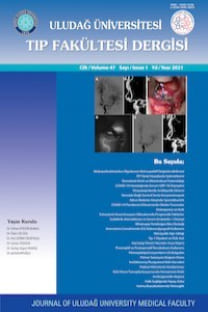Behçet Hastalığı Dışındaki Sebeplerle Oluşan Non-Enfeksiyöz Posterior Üveite Sekonder Makula Ödeminde Deksametazon İmplantın Etkinliği.
Adjuvan, Deksametazon implant, Kistoid makula ödemi, Non-infeksiyoz üveit
Efficacy of Dexamethasone Implant in Secondary Macular Edema due to Posterior Non-Infectious Entities Other than Behçet Disease.
___
- 1.Durrani, O.M., C.A. Meads, P.I. Murray. 2004. Uveitis: apotentially blinding disease. Ophthalmologica 218: 223–236.
- 2.Dick AD, Tundia N, Sorg R et al. Risk of ocular complications in patients with noninfectious ıntermediate uveitis, posterioruveitis, or panuveitis. Ophthalmology. 2016;123:655-62.
- 3.Zouboulis CC. Epidemiology of Adamantiades-Behçet’s disea-se. Ann Med Interne 1999;150:488-98.
- 4.Kazokoglu H, Onal S, Tugal-Tutkun I et al. Demographic andclinical features of uveitis in tertiary centers in Turkey. Opht-halmic Epidemiol. 2008;15:285-93.
- 5.Onal S, Kazokoglu H, Koc A et al. Long-term efficacy andsafety of low-dose and dose-escalating interferon alfa-2a the-rapy in refractory Behçet uveitis. Arch Ophthalmol.2011;129:288-94.
- 6.Chang-Lin JE, Attar M, Acheampong AA et al. Pharmacokine-tics and pharmacodynamics of a sustained-release dexametha-sone intravitreal implant. Invest Ophthalmol Vis Sci.2011;52:80-6.
- 7.Boyer DS, Yoon YH, Belfort R Jr et al. Three-year, randomized, sham-controlled trial of dexamethasone intravitreal implant inpatients with diabetic macular edema. Ophthalmology.2014;121:1904-14.
- 8.Palla S, Biswas J, Nagesha CK. Efficacy of Ozurdex implant intreatment of noninfectious intermediate uveitis. Indian J Opht-halmol 2015;63:767-70.
- 9.Ossewaarde-van Norel A, Rothova A. Clinical review: Update on Treatment of Inflammatory Macular Edema, Ocular Immu-nology and Inflammation, 19:1, 75-83.
- 10.Sella R, Oray M, Friling R, Umar L, Tugal-Tutkun I, Kramer M.Dexamethasone intravitreal implant (Ozurdex®) for pediatricuveitis. Graefes Arch Clin Exp Ophthalmol. 2015;253:1777-82.
- 11.van Kooij B, Probst K, Fijnheer R, Roest M, de Loos W, Rot-hova A. Risk factors for cystoid macular oedema in patientswith uveitis. Eye. 2008;22:256–260.
- 12.Thorne JE, Daniel E, Jabs DA, Kedhar SR, Peters GB, Dunn JP.Smoking as a risk factor for cystoid macular edema complica-ting intermediate uveitis. Am J Ophthalmol. 2008;145:841–846.
- 13.Markomichelakis NN, Halkiadakis I, Pantelia E, et al. Courseof macular edema in uveitis under medical treatment. Ocul Im-munol Inflamm. 2007;15:71–79.
- 14.Tuncer S, Yilmaz S, Urgancioglu M, Tugal-Tutkun I. Resultsof intravitreal triamcinolone acetonide (IVTA) injection for thetreatment of panuveitis attacks in patients with Behçet disease.J Ocul Pharmacol Ther 2007; 23: 395-401.
- 15.Kuppermann Bd, Blumenkranz Ms, Haller Ja, et al. Randomi-zed controlled study of an intravitreous dexamethasone drugdelivery system in patients with persistent macular edema. ArchOphthalmol. 2007;125:309–317.
- 16.Pelegrín L, de la Maza MS, Molins B, Ríos J, Adán A. Long-term evaluation of dexamethasone intravitreal implant in vitrec-tomized and non-vitrectomized eyes with macular edema se-condary to non-infectious uveitis. Eye. 2015;29:943-50.
- 17.Cao JH, Mulvahill M, Zhang L, Joondeph BC, Dacey MS.Dexamethasone intravitreal implant in the treatment of persis-tent uveitic macular edema in the absence of active inflamma-tion. Ophthalmology. 2014; 121: 1871–1876.
- 18.Tomkins-Netzer O, Taylor Sr, Bar A, et al. Treatment withrepeat dexamethasone implants results in long-term diseasecontrol in eyes with noninfectious uveitis. Ophthalmology.2014;121:1649–1654.
- 19.Zarranz-Ventura J, Carreño E, Johnston RL et al. Multicenter study of intravitreal dexamethasone implant in noninfectiousuveitis: indications, outcomes, and reinjection frequency. Am JOphthalmol. 2014;158:1136–1145. e1135
- 20.Deuter CM, Kötter I, Günaydin I, Stübiger N, Doycheva DG,Zierhut M. Efficacy and tolerability of interferon alpha treat-ment in patients with chronic cystoid macular oedema due tonon-infectious uveitis. Br J Ophthalmol. 2009;93:906–913.
- 21.Markomichelakis NN, Theodossiadis PG, Pantelia E, Papaeft-himiou S, Theodossiadis GP, Sfikakis PP. Infliximab for chro-nic cystoid macular edema associated with uveitis. Am J Opht-halmol. 2004;138:648–650.
- 22.Diaz-Llopis M, García-Delpech S, Salom D, et al. Adalimumab therapy for refractory uveitis: a pilot study. J Ocul PharmacolTher. 2008;24:351–361.
- 23.Agrawal R, Lee C, Phatak S, Pavesio C. Immunopharmacothe-rapy of non-infectious uveitis: where do we stand? Expert OpinBiol Ther. 2014;14:1719-22.
- ISSN: 1300-414X
- Başlangıç: 1975
- Yayıncı: Seyhan Miğal
Yürüme Güçlüğü ile Başvuran Hastada Normal Basınçlı Hidrosefali
Ataman KÖSE, Seyran BOZKURT, Seçil KARTAL, İbrahim TOKER, Arda YILMAZ
Nadir Bir Patolojik Kırık Nedeni: Amiloidoma
Mine ÖZŞEN, Ülviye YALÇINKAYA, Sadık BİLGEN, Zeynep YAZICI
Özgür YALÇINBAYIR, Enver ÇALIŞKAN, Öner GELİŞKEN, Mustafa RİGAN, Gamze UÇAN, Berkant KADERLİ, Ahmet Ali YÜCEL
Cerrahi Olarak Tedavi Edilen Beyin Apselerinin Retrospektif Analizi: Tek Merkez Deneyimi
Meme Kanseri, Uyku ve Müzik Tedavisi
Renal Anjiomiyolipomaların Klinik ve Histopatolojik Özellikleri: 21 Olguluk Seri
Berna VURUŞKAN, Sevda AKYOL, Hakan VURUŞKAN
Özgür YALÇINBAYIR, Gamze UÇAN, Öner GELİŞKEN, Berkant KADERLİ, Ahmet Ali YÜCEL, Enver ÇALIŞKAN, Mustafa RİGAN
Presigmoid Yaklaşımda Cerrahi Anatomi ve Klinik Komplikasyonlar
Rövşen BAGİROV, Mevlüt Özgür TAŞKAPILIOĞLU, Selçuk YILMAZLAR
Acil Servise Göz Yakınmaları ile Başvuran Hastaların Demografik Analizi
Özlem KARASU, Vahide Aslıhan DURAK, Erol ARMAĞAN
Türk Histoloji Tarihinde Prof.Dr. Şermin Paker ve Histolojiye Katkıları
